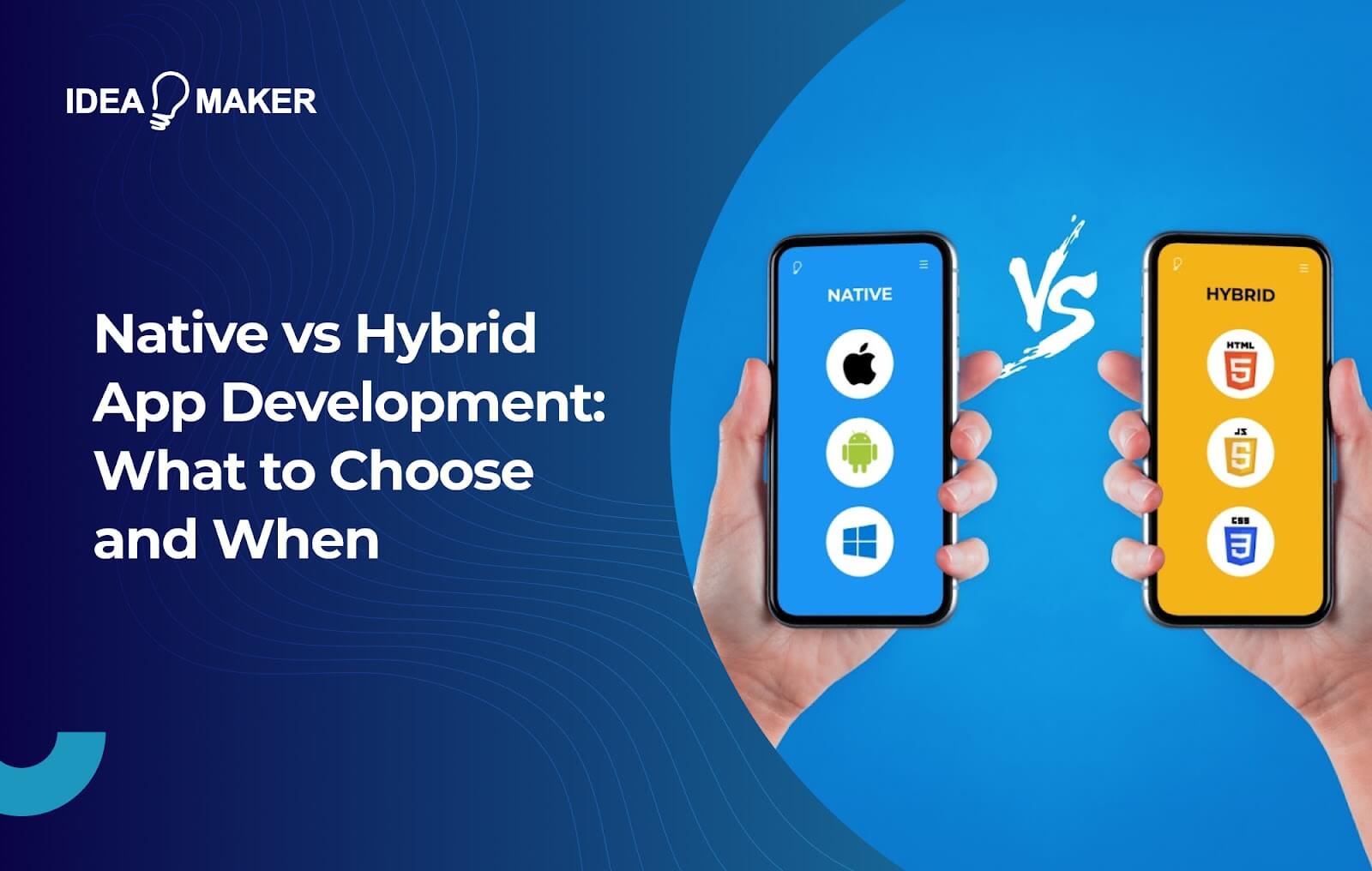In an age when people use smartphones for everything, we can see a significant increase in different mobile apps every day. Today, The Apple App Store has 1.96 million apps, while the Google Play Store has around 2.87 million apps available for download.
Staying competitive in such a huge mobile app market is not easy if you do not know what app development approach to choose and when to choose it. It is best to understand the pros and cons of each approach before making your decision. In this blog, we will discuss what native and hybrid app development are and how they influence the key factors of app development.
Table of Contents
What is a Native App?
If you have used Google Maps at least once, you have used native mobile apps. They are the applications that operate only on specific operating systems and devices such as Apple iOS and Android devices, desktop computers, and smart TVs. Developers use platform-specific programming languages such as Objective-C or Swift for iOS and Java or Kotlin for Android for building native apps. One of the major advantages of a native app is that it can take advantage of a mobile device’s underlying functionalities such as the GPS, accelerometer, and camera.
What is a Hybrid App?
Hybrid mobile app development combines native and web application elements by embedding code from web development languages such as JavaScript, React Native, Flutter, CSS, and HTML. You can see a hybrid app as a web app in a native app shell. The hybrid apps use plugins like Apache Cordova to access the native elements. Hybrid apps are popular among developers because they need to write code only once, and they can use the same code on multiple platforms.
Now that you have a basic idea of native and hybrid development, let’s compare them against each other.
Native vs Hybrid Apps: Which One to Choose?
There are several factors to consider when choosing the right app development approach.
App Performance
One main attribute to consider is how much you value the performance of the application you develop. In terms of app performance, it is best to take a native mobile app development approach because they take advantage of the hardware and software of their native devices better than a hybrid app. It is easy to optimize the performance using native-app functionalities such as memory management. Native apps are usually optimized for a particular platform, meaning they are comparatively faster than hybrid apps, have higher responsiveness, and have less load time.
Development Costs and Time
When developing mobile apps, the available budget and time are two important things companies need to consider. If you choose to develop a hybrid app, you only have to write the code once as it is deployable on multiple platforms. This significantly reduces the development time and costs. In contrast, native apps require separate codebases for iOS and Android platforms. This can be a daunting task, especially for a limited-budget startup. Thus, if your first and foremost concern is the available budget, it is best to choose hybrid apps.
Number of Bugs During Development
Maintaining two different mobile apps with one codebase, as is the case with hybrid apps, is challenging. Native apps, on the other hand, have two codebases: one for iOS and a separate one for Android applications. They also do not depend on plugins like Apache Cordova, Xmarin, etc., so there is less chance to have bugs in the codebases.
When there is an update to the operating system (OS), native app developers get access to the latest software development kit (SDK), but hybrid app developers need to wait until third-party tools like Xamarin and Cordova start supporting features of the latest OS versions. As there is no control over this extra layer of dependency in hybrid apps, the process is more vulnerable to additional bugs.
App Security
Today, organizations and individuals consider app security as one of their major concerns when evaluating a mobile app for their requirements. If you consider native vs hybrid app development approaches, native apps possess more security features than hybrid apps. As a result, it is easy for native developers to integrate security features like encryption. However, since hybrid apps rely on web languages such as HTML and Javascript, they are vulnerable to web attacks such as cross-site scripting (XSS) and HTML5 insecure storage. If you are more concerned with app security than your available budget, choosing native app development over the hybrid approach is best.
User Experience and Customizations
When it comes to mobile app usage, the user experience can make or break the mobile app. If you can provide a positive user experience, it will encourage user engagement and retention. In this case, it is better to choose native apps, as they have more UI features and customization abilities than hybrid apps.
Time to market
Every company tries to launch its app as quickly as possible. If you consider native and hybrid apps, hybrid apps have a shorter development lifecycle and are quicker to deploy to multiple platforms than native apps since developers only need to write the code once. If the time to market is a major concern, it is best to choose hybrid apps over native apps.
When to Consider Native Apps?
Choose native apps when:
- You want to give your customers the best user experience and performance
- The app needs to support device-specific functionalities such as GPS, accelerometer, and mobile camera
- App security is the prime concern
- You want to avoid bugs as much as possible
The popular messaging app WhatsApp is an example of a native application.
When to Consider Hybrid Apps?
Choose hybrid apps when:
- You want to launch the app as fast as possible
- You have a limited budget and time to market is critical
- Targeting the audience of both web and mobile devices
Facebook is an example of a successful hybrid application that uses React Native.
Summary
Native and hybrid app development are two popular approaches in today’s mobile apps market. Native apps are for specific types of mobile devices and operating systems, while a mobile hybrid app combines native and web apps. This article discussed each approach and when to choose native vs hybrid apps based on performance, cost, security, number of bugs, user experience, and time to market.



















